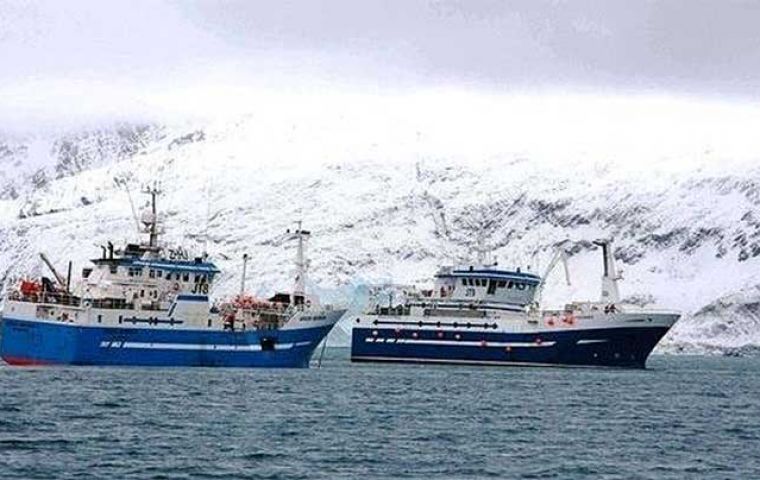MercoPress. South Atlantic News Agency
UK “must expand the Blue Belt” in Overseas Territories to shield the Antarctic from Chinese industrial fishing
 At the first available opportunity, 2018, the Conservatives decided to increase the amount of SGSSI’s waters that were “fully protected” from industrial fishing from two per cent to 23 per cent.
At the first available opportunity, 2018, the Conservatives decided to increase the amount of SGSSI’s waters that were “fully protected” from industrial fishing from two per cent to 23 per cent. By Sir Oliver Heald (*) The UK’s Blue Belt Programme for ocean conservation in our Overseas Territories is one of the Conservative Party’s biggest environmental achievements of the past thirteen years.
But Russian interference and Chinese fishing interests are putting the future increased success of the programme at risk. With another opportunity to increase ocean protections within our reach, we must seize it.
The UK is the guardian of one third of the world’s penguin population. As statistics go, it is a remarkable one. It is up there with the fact that the waters around our Overseas Territories, where most of these penguins live, cover two per cent of the world’s ocean.
Recognising the sheer scale of the opportunity, successive Conservative administrations have sought to protect the wildly biodiverse flora and fauna that inhabit the waters of our Overseas Territories by creating and regularly expanding the Blue Belt.
The programme now protects, to varying degrees, an area of ocean the size of India. It includes ten different Overseas Territories and, as a result, spans the entire globe. And, as environmental protections go, it is incredibly cheap: it works out at just £10 per kilometre squared to monitor, survey, and enforce the protection of these waters.
Quite simply, if you are looking for examples for conservative environmental achievements, look no further than the Blue Belt. It epitomises what it means to be a real environmental leader on the world stage. It demonstrates that the Conservative Party is a party of long-term environmental action, not one of slogans and political posturing.
Recognising the need to build up trust with voters when it comes to the environment, a firm and ambitious commitment to further strengthen the Blue Belt will help to do this. At the end of the year, we have the opportunity to do exactly that and we must seize it.
South Georgia and the South Sandwich Islands (SGSSI) is a remote archipelago in the South Atlantic Ocean, close to the Antarctic. Although not a household name, this Overseas Territory is actually more biodiverse than the oft-cited Galapagos Islands.
Once depleted by an industrial whaling operation, sightings of humpback and sperm whales are now a regular occurrence around SGSSI. The islands do not have a permanent human population, but South Georgia alone is home to as many as 100 million seabirds, including the Antarctic’s only songbird, the South Georgia pipit, and many millions of penguins.
It is no wonder that the Conservative government of the day, in partnership with SGSSI officials, chose to protect this nature-rich archipelago by adding it to the Blue Belt Programme and designating the waters a marine protected area (MPA).
But we did not stop there. At the first available opportunity, 2018, the Conservatives decided to increase the amount of SGSSI’s waters that were “fully protected” from industrial fishing from two per cent to 23 per cent (283,000km²).
Given the room and time to thrive, the nutrient-rich waters of South Georgia are full of plankton and krill which underpin the food chain for creatures on and around the islands. Unfortunately, bountiful supplies of krill are not just good for marine life – but also for industrial fishing.
As China’s aquaculture industry continues to boom, so too does its demand for krill. Chinese vessels see the region as prime fishing territory and, if its lobbying efforts in the region are successful, an additional 500,000 tons of krill will be caught.
This poses a threat to the South Georgian food chain. Only waters that are fully protected can ward off the threat of industrial fishing. The remaining 77 per cent of the Territory’s waters that are not fully protected are therefore at risk, as are the animals that inhabit them.
The risk increases if we fail to act. The multinational body responsible for governing the nearby Antarctic region is currently chaired by Ukraine. Unfortunately, in an act of geopolitical spite, the veto mechanism is repeatedly being used by fellow member, Russia, to block any and all action to protect the seas. Progress has proved impossible.
In the past five years, wildlife has thrived, but the risks posed to these remote islands have continued to grow. Fortunately, at the end of this year, the Government has a new opportunity to protect South Georgia even further, as part of the five yearly review of the MPAs.
Ministers should increase the amount of protections around South Georgia, the largest island in the archipelago, and grant full protections to the waters around the South Sandwich Islands. With monitoring already established, doing so would come at no additional cost to the Foreign Office, nor to the economy of the islands themselves.
The Blue Belt is the jewel in the crown of Conservative environmental action over the last thirteen years. With a clear opportunity to strengthen ocean protections for our Overseas Territory this year, and to keep China and Russia in check, we would be wrong not to take it.
(*) Sir Oliver Heald is the Conservative Member of Parliament for North East Hertfordshire. The piece was published in The Conservative Home, a Conservative blog for news.




Top Comments
Disclaimer & comment rulesCommenting for this story is now closed.
If you have a Facebook account, become a fan and comment on our Facebook Page!